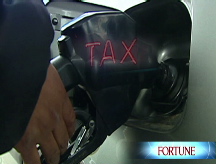Why cheap gas can't save the economy
Gas prices below $2 are a relief to many consumers. But there are too many other problems in the economy for it to have a major positive impact.
NEW YORK (CNNMoney.com) -- The stock market stinks like a moldy piece of Limburger cheese. Unemployment is on the rise. Home prices continue to fall. There are fears that one or more of Detroit's Big Three could go bankrupt.
There is, however, one bit of good economic news: The average price of gasoline is now less than $2 a gallon for the first time since March 2005, down 52% from the peak of $4.11 in July.
That - in theory - means more money for people to spend and get the economy going. Mark Zandi, chief economist for Moody's Economy.com, says that if gas prices stay around $2 a gallon throughout 2009, that would save consumers about $100 billion compared to this year.
But don't get too excited: There may be less pain at the pump - but there's pain just about everywhere else.
"Every penny helps and the savings are significant," said Zandi. "But the negatives so far outweigh the positives that the economy will have a tough time in 2009," Zandi said.
The two biggest problems, according to Sean Snaith, director of the Institute for Economic Competitiveness at the University of Central Florida in Orlando, are the stock market turmoil and housing meltdown.
"Is this a panacea for consumers? No, It's like putting an analgesic on a deep wound," Snaith said. "Trillions of dollars in stock market wealth and home values are gone. Saving a few bucks at the pump can't compensate for that."
Snaith added that he believes many consumers are skeptical as to whether lower prices will really stick. So he doesn't think consumers will rush to start spending.
"People are skeptical. We're not going to run out and all go buy Hummers again. The memory of $4 gas will linger," he said.
This is playing out in the form of dismal forecasts for the holiday shopping season. According to a survey of consumers by the Conference Board released Friday, Americans are expected to spend an average of $418 on Christmas gifts, down 11% from estimates from the same time a year ago.
"This is shaping up to be one of the most challenging holiday seasons in years and it's going to take more than the usual discounts and incentives from retailers to get consumers to spend more freely," said Lynn Franco, director of The Conference Board Consumer Research Center in a release.
Still, shouldn't lower gas prices have some impact? After all, before the credit crisis took center stage in September, it seemed that the only financial news that mattered was the ever-rising price of gas.
Some experts speculated earlier this summer that the average price of gas would hit $5 a gallon or even higher by the end of the year. That's clearly not going to happen. So at least one financial expert believes that cheaper gas prices will lead to a brighter holiday shopping season than most expect.
"As consumers become more comfortable with extended lower prices for fuel -- look for increased discretionary spending in other areas. Falling energy prices should improve the prospects for better than currently anticipated holiday spending by consumers," wrote Bill Knapp, investment strategist for MainStay Investments, in a note to clients Thursday.
I'd love to think Knapp is right. And I, as many of my loyal readers are happy to point out, tend to do my best Monty Python and always look on the bright side of life. But even I can't share this sense of hope.
While $2 gas is obviously better than $4 gas, it's not enough to kick start consumer spending. And heck, that's probably a good thing (yeah yeah, there I go being optimistic again). After all, if this financial crisis has taught us anything, it should be that binging on credit is a very very bad thing.
So if consumers take some of the cash they now have from lower prices at the gas station and using it to save, invest and pay down debt, that would be encouraging news indeed. ![]()



